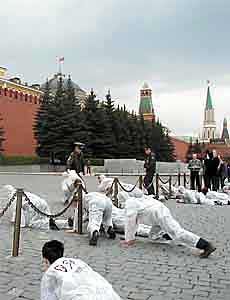
From Ukraine peace plans to Kazakh uranium—all that and more in our new nuclear digest
Our November Nuclear Digest by Bellona’s Environmental Transparency Center is out now. Here’s a quick taste of just three nuclear issues arising in U...
News

Publish date: February 5, 2003
Written by: Charles Digges
News
The offer of US-controlled spent nuclear fuel, or SNF, to Moscow in exchange for Russia’s ceased co-operation with Iranian nuclear power efforts has been privately put on the table over the last several months by arms control negotiators. But Boucher’s statements on Saturday represent one of Washington’s first public endorsements of what, to environmentalists, would be a controversial compromise to arrest possible proliferation risks in the Muslim state.
Speaking at a State Department briefing, Boucher reiterated Washington’s long-standing opposition to Russian assistance in the construction of an $800m light-water reactor in the Iranian port of Bushehr. In addition to this reactor, Russia has also sketched broad plans that could include the construction of as many as five more Iranian reactors as part of a $10bn, Kremlin-sponsored economic co-operation plan with Tehran.
"We have underscored to Russia that an end to Russian nuclear assistance to Iran would allow the United States and Russia to reap the full promise of our new strategic relationship, benefiting Russia economically and strategically far more than any short-term gain from construction of additional reactors or other sensitive transfers to Iran," Boucher said.
As an incentive, Boucher said, Washington is prepared to loosen import restrictions on the estimated 70%-90% of the world’s SNF that is controlled by the United States.
"If the Russians end their sensitive cooperation with Iran, we have indicated we would be prepared to favourably consider such transfers, an arrangement potentially worth several billion US dollars in revenue to Moscow," he said.
The Russian Atomic Energy Ministry, or Minatom, has repeatedly dismissed US concerns about the Bushehr reactor, which is scheduled to come online in early 2004. It has also denied that its collaboration with Tehran could provide the necessary ingredients for a nuclear weapons programme.
Minatom’s commercial interests extend to the "axis of evil"
But in late December, the Pentagon publicised satellite photos that appeared to reveal two nuclear facilities in Iran that could be used for producing atomic bombs. US Defense Department officials said at the time that the two sites — one a heavy water reactor that could produce plutonium, the other a uranium enrichment facility — had been built with Russian assistance.
Moscow and Tehran have flatly denied this. But neither government has publicly offered an explanation about where these two facilities fit in to Iran’s "peaceful" nuclear pursuits. Officials from the International Atomic Energy Agency, or IAEA, are expected to inspect the sites later this month with an eye to installing monitoring safeguards.
Boucher said Saturday that Bushehr is "a cover and a pretext" for Iran to obtain "sensitive technologies to advance its nuclear weapons programme."
"The recent revelations that Iran has been secretly constructing nuclear-related facilities capable of producing fissile material not needed for Iran’s ‘peaceful’ nuclear energy needs is but one example of the sustained effort by Iran to cloak the true activities and intentions of its nuclear programme," he said.
Minatom has for the last three years actively pursued negotiations with the United States to allow US-controlled SNF to be sent to Russia for storage. In 2001, Russian parliament passed a controversial legislation package allowing imports of radioactive waste. Minatom has said Russia could bank $20bn over the next 10 years by taking nuclear waste for storage and reprocessing, but Washington’s overwhelming control over the world’s SNF has thwarted these aspirations.
Despite the possibly lucrative offer, Minatom officials, speaking on the condition of anonymity, made it clear this week that they viewed their "profitable co-operation" with Iran as far more valuable. This is consistent with Minatom’s apparent goals of pursuing international contracts in nearly every state that approaches it for assistance.
But Minatom’s commercial interests — which extend into the so-called "axis of evil" — are colliding more and more with the Kremlin’s post September 11 2002, alignment with US security considerations.
In addition to its pursuits in Iran, Minatom chief Alexander Rumyantsev has suggested that the ministry would assist North Korea in the construction of light-water reactors if Pyongyang asked for help. The Moscow-based anti-nuclear group, Ecodefence!, also announced last month on its web site, www.antiatom.ru, that Minatom is pursuing reactor contracts with Syria, although the Russian Foreign Ministry has denied this.
In his statements, Boucher said that it remained unclear how Iran, with its abundance of oil and natural gas, would benefit from an expensive effort to develop nuclear energy.
"Iran’s copious oil and natural gas reserves put into question Iran’s stated rationale of pursuing nuclear energy for peaceful purposes — it currently throws away more energy annually by flaring off natural gas than Bushehr could produce," Boucher told reporters.

Our November Nuclear Digest by Bellona’s Environmental Transparency Center is out now. Here’s a quick taste of just three nuclear issues arising in U...

For three years now, Bellona has continued its work in exile from Vilnius, sustaining and expanding its analysis despite war, repression, and the collapse of international cooperation with Russia in the environmental and nuclear fields

The Board of the Bellona Foundation has appointed former Minister of Climate and the Environment Sveinung Rotevatn as Managing Director of Bellona No...

Økokrim, Norway’s authority for investigating and prosecuting economic and environmental crime, has imposed a record fine on Equinor following a comp...